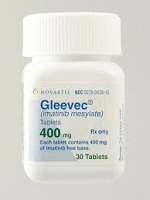 Mumbai-based Sun Pharmaceutical Industries met an in-house deadline of Feb. 1 to launch sales of generic Gleevec/Glivec (imatinib) in the U.S. that included a savings card program to cut the co-payment out-of-pocket costs for the cancer treatment with certain pharmacies. "The savings card will reduce patient's co-payment (out-of-pocket) to $10," the company said in a release. "In line with its philosophy of putting patients first, Sun Pharma's Imatinib Mesylate Savings Card will also offer patients additional savings benefit of up to $700 for a 30-day fill to offset any additional out-of-pocket cost should they be required to meet their deductible or co-insurance." Sun, as first to file, now starts a 180-day marketing exclusivity period on the generic that puts it head-to-head with Novartis ($NVS). On the Jan. 27 earnings call, Novartis said it fully expected Sun to meet the launch date. Release
Mumbai-based Sun Pharmaceutical Industries met an in-house deadline of Feb. 1 to launch sales of generic Gleevec/Glivec (imatinib) in the U.S. that included a savings card program to cut the co-payment out-of-pocket costs for the cancer treatment with certain pharmacies. "The savings card will reduce patient's co-payment (out-of-pocket) to $10," the company said in a release. "In line with its philosophy of putting patients first, Sun Pharma's Imatinib Mesylate Savings Card will also offer patients additional savings benefit of up to $700 for a 30-day fill to offset any additional out-of-pocket cost should they be required to meet their deductible or co-insurance." Sun, as first to file, now starts a 180-day marketing exclusivity period on the generic that puts it head-to-head with Novartis ($NVS). On the Jan. 27 earnings call, Novartis said it fully expected Sun to meet the launch date. Release
> Drugmakers in India were told this past week by the country's commerce minister that they would receive cash incentives to help them with exports. Report
> The U.S. Food and Drug Administration has approved Tokyo-based Eisai's sea sponge-derived Halaven drug to treat soft tissue cancer. Report
> More than 7,500 people in China die from cancer every day with 2.8 million dying from the disease in 2015. Report
> Details about Russia's Ebola vaccine are starting to emerge with some researchers saying Russia's success in rolling out the treatment may be because it started out as a way to fight biological weapons. Report
> The state government in India's Madhya Pradesh has failed to warn users of the Roche ($RHHBY) drug Avastin about potential serious side effects when used for off-label purposes. Report
> A clinical trial in Australia has shown that 80% of patients with chronic lymphocytic leukemia responded to a new treatment that saw the cancer cells "simply melt away," according to one researcher. Report
> Researchers at Singapore's Institute of Bioengineering and Nanotechnology found a more efficient DNA technology to detect and treat infectious diseases and cancer. Release
> Melbourne-based Cancer Therapeutics CRC is working on global trials for a cancer drug candidate licensed to Merck ($MRK) in a potential a $730 million deal announced earlier. Report
> U.S.-based HUYA Bioscience International said Japan's Eisai has licensed its non-Hodgkin's lymphoma candidate HBI-8000 in Japan, South Korea, Thailand, Malaysia, Indonesia, Philippines, Vietnam and Singapore. HUYA will develop the candidate in Japan for commercialization by Eisai in exchange for an unspecified upfront payment and milestones and royalties that could total $280 million. Release
> China-focused Aoxing Pharmaceutical named James Chen as chief financial officer effective Feb. 1. Release
> Japan's Ministry of Health, Labor and Welfare on Jan. 22 notified details on the eligibility of Sakigake products for priority review. MHLW website
> Japan's Ministry of Health, Labor and Welfare on Jan. 22 launched details of its humanitarian clinical trials program for experimental drugs to patients outside of registered clinical trials. MHLW website
> Mumbai-based Unichem Laboratories won a nod from the U.S. FDA to market alfuzosin hydrochloride extended release tablets, used in treating prostatic hyperplasia. Report
> Hyderabad, India-based Dr. Reddy's Laboratories received U.S. FDA approval to market injectable acute migraine treatment Zembrace SymTouch. Report